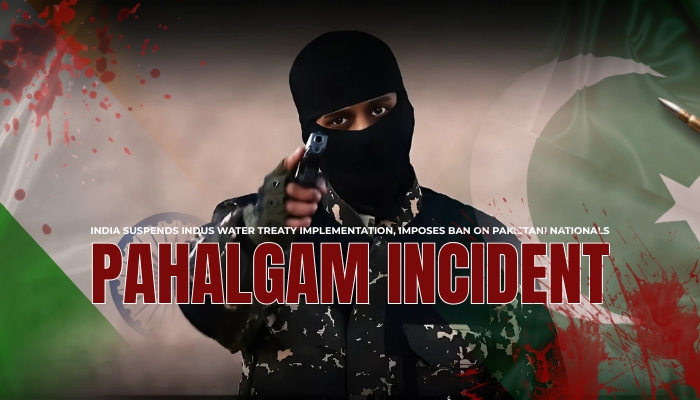New Delhi Orders Closure of Wagah-Attari Border; Pakistanis in India Given 48-Hour Deadline to Depart

Pahalgam Incident: India suspends Indus Water Treaty
On Wednesday, India announced the suspension of the Indus Water Treaty and imposed a ban on Pakistani citizens entering the country. This move came in response to the tragic incident a day earlier, in which at least 26 tourists lost their lives in Indian Illegally Occupied Jammu and Kashmir (IIOJK).
The latest steps taken by New Delhi represent a significant intensification of tensions between the two nuclear-armed neighbors in South Asia.
Following a meeting of the Cabinet Committee on Security — India's top authority on national defense matters — the Ministry of External Affairs (MEA) outlined five key actions. Officials described these as a “firm response to cross-border terrorism.”
Indian diplomat Vikram Misri told reporters in New Delhi that the Indus Waters Treaty of 1960 will be suspended immediately and will remain so until Pakistan convincingly and permanently renounces its backing of cross-border terrorism.
The Indus Water Treaty, brokered by the World Bank, is a water-distribution pact between India and Pakistan. Under this agreement, India has rights over the eastern rivers of the Indus basin—Ravi, Beas, and Sutlej—while Pakistan oversees the western rivers—Indus, Jhelum, and Chenab.
Additionally, he announced the immediate shutdown of the Integrated Check Post at Attari. “Individuals who entered India with valid documentation may return via the same route by May 1, 2025,” he stated.
The diplomat further stated that Pakistani citizens will no longer be allowed entry into India under the SAARC Visa Exemption Scheme (SVES). All previously issued SVES visas to Pakistani nationals are now considered void, and those currently in India on such visas must depart within 48 hours.
This announcement follows the Deadly Attack: Over 20 Killed as Gunmen Open Fire on Tourists in Indian-Controlled Kashmir, which prompted India’s swift and severe response
In a further escalation, India declared the military, naval, and air attachés stationed at the Pakistani High Commission in New Delhi as persona non grata, ordering them to exit the country within seven days.
The diplomat also confirmed that India will recall its own defense officials from the Indian High Commission in Islamabad, effectively dissolving these roles in both diplomatic missions.
Moreover, India plans to downsize its diplomatic staff in both capitals, reducing the number of personnel at each High Commission to 30 from the current 55. This reduction is scheduled to take effect by May 1, 2025.
The incident unfolded just a day after 26 individuals lost their lives at a popular tourist spot in Indian Illegally Occupied Jammu and Kashmir, marking the deadliest assault on civilians in India in nearly 20 years.
According to police, the attack took place on Tuesday in the picturesque Baisaran Valley near Pahalgam, located in the Himalayan union territory of Jammu and Kashmir. The victims included 25 Indian nationals and one person from Nepal, while at least 17 others sustained injuries during the gunfire.
This mass shooting is the most severe civilian attack since the 2008 Mumbai terror strikes and has disrupted a period of relative peace in IIOJK, a region where tourism had seen significant growth amid a decline in anti-India militancy.
The attack is viewed as a blow to Prime Minister Narendra Modi and his Hindu nationalist party, the Bharatiya Janata Party (BJP).
Following the attack, security forces swiftly deployed to the Pahalgam region and initiated a search operation in the surrounding forests, according to two security sources who spoke to Reuters. Around 100 individuals, believed to have previously shown sympathy toward rebels, were summoned to local police stations for questioning, they further reported.
The police also shared sketches of three out of the four suspected assailants, who were reportedly wearing traditional long shirts and loose trousers, with one of them equipped with a body camera, according to a security source. At the time of the attack, approximately 1,000 tourists and around 300 local service providers and workers were present in the valley, the source added.
A relatively obscure group called the "Kashmir Resistance" took responsibility for the attack through a social media post. The group voiced its frustration over the settlement of more than 85,000 "outsiders" in the region, which it claimed was causing a "demographic shift."
Pakistani foreign ministry spokesperson Shafqat Ali Khan expressed concern over the loss of tourist lives in a statement, saying, "We are deeply saddened by the tragedy. Our condolences go out to the families of the victims, and we wish a swift recovery to those injured."
Comments